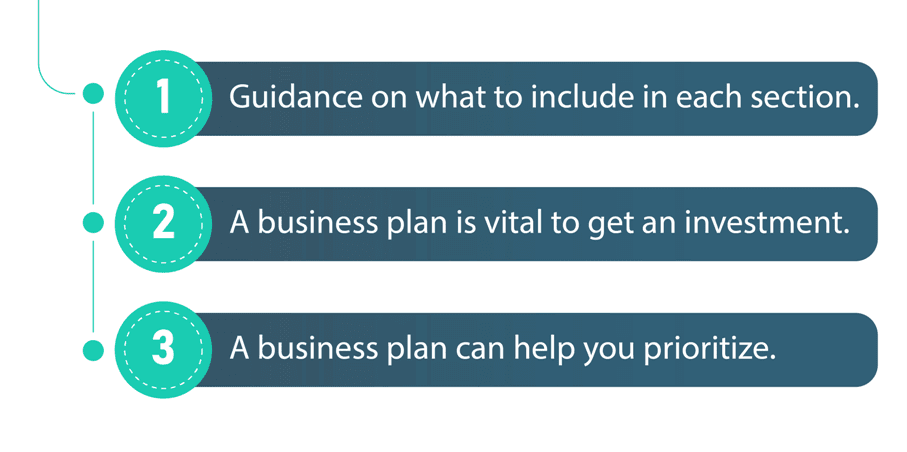

To help you write your business plan, we have created a library of business plan examples for almost all industries.

Writing a business plan from scratch seems like an uphill climb? We get that, but hold tight—you’re not alone. Even business plan writers often feel the same way while writing from scratch. That’s where a little content reference or inspiration can help—just like these business plan examples.
Reading such real-life sample business plans can be incredibly helpful while drafting your very first business plan with zero clue about business plan writing.
As you read and explore these industry-specific examples, you learn more about what you should and should not include in your business plan, ensuring sustainable and long-term growth.
So, let’s explore these 400+ business plan examples to help you quickly write a business plan—hassle-free.

A Business plan example will provide you with the complete format and structure for your document, giving you a head start on developing your document so you’re not stuck seeing an empty page working to find out where to start.
Also, it gives you the overall layout of a professional business plan so you understand what goes where and you’re not leaving out anything.
Here are some of the key benefits of using sample business plans:
Creating a business plan will help you define the business goals you want to achieve, and define the strategies to achieve them. This means you can focus your resources and energy on what is important, rather than wasting time on unimportant things.
If you’re working with a team in your company then having a regular brainstorming session is the best way to keep your business on track and your business plan assures you’re all on the same page.
Make your plan in half the time & twice the impact with Upmetrics.

Following is the standard business plan format you must consider while drafting a comprehensive business plan.
This was about the outline. Now let’s break down and understand how to write each section, step by step, with real-life examples.
Executive Summary is the first section of your business plan, providing a high-level overview of your entire plan and summarizing it for a quick understanding of your business.
Considering it as an introductory section of your plan, it must be clear, concise, and written to grab readers’ attention and persuade them to take action.
As business plans can be 10-20 to a hundred-page long, an executive summary remains your sole chance to gain a quick extra point.
Here are a few key components your Executive Summary must include:
Remember, you are bound to cover these topics in detail moving forward in your business plan, so make sure your executive summary is brief, covering only the key takeaways.
As the name suggests, the Company Overview section of your plan provides an overview of your small business, including your business concept, objectives, future goals, and what customers your business serves.
Since you will provide a brief company description in the executive summary, this section will expand on it—providing an in-depth understanding of your business.
Remember, this section is a platform for introducing and positioning your business as an ideal solution for your target market to your reader. So, make sure it’s short and succinct but impactful enough to help them understand what it does, who your potential customers are, and how you can make a difference.
Here are a few key components your business overview must include:
Market Analysis is a study of your external business environment, providing a complete overview of your industry and its dynamics. This section provides valuable insights into the market, like what’s working.
When smartly researched, utilized, and written, this section can help you discover and identify untapped areas in the market and strategize to stand out from your competitors.
Remember, this section helps your readers and potential investors understand your target market, market size, and growth potential, so make sure you play your cards right.
Here are a few key components your market analysis section must include:
Unlike other sections of your business plan, Market Analysis requires deep research and analytical work. However, using an industry-specific example business plan can save hours of research work.
The products and services section is where you will mention and elaborate on your product or service range, description, pricing strategies, and more.
Since your business success solely depends on your products or services, your entire plan revolves around this particular section.
This section can be a crucial component of your plan while searching for an investor or partner, as a well-articulated products and services section can help you persuade them.
Here are a few key elements your products and services section must include:
A business’s sales and marketing strategies determine how your product is displayed and reaches your target audience.
A well-designed sales and marketing plan can help you streamline your marketing efforts and create impactful and effective marketing campaigns while keeping track of the marketing budget and maximizing return on investment.
In short, this section will discuss how you’ll acquire new customers using your sales and marketing strategy. You might consider including the following information in your sales and marketing plan:
The operations plan section outlines the daily business processes and activities centered on achieving business goals and objectives described in the previous sections of your plan.
A detail-oriented logistics and operations plan helps you and your team define your responsibilities, daily tasks, and short-term goals you need to achieve, keeping track of your long-term objective.
Remember, your logistics and operations plan won’t be static but a living document. You may adjust and update it as time goes on.
Here are a few key elements your operations plan section must include:
Your management team plays a crucial role in the ultimate success of your business. And this section introduces your owners and management team, along with their qualifications, industry experience, roles and responsibilities, and compensation plan.
A strong management team section can be critical to weigh authority and help investors be confident about your business idea and vision.
Make sure to include the educational background, accomplishments, work experience, and area of expertise for each individual, part of your management.
You might consider including the following information in the management team section:
It’s no secret that the financial plan is the most crucial yet nerve-wracking aspect of business planning. In fact, it’s one of the deciding factors when it comes to convincing potential investors and banks to invest or lend money.
This section of your plan details your business’s financial information and how it will reach its financial goals. The information may include balance sheet, income, and cash flow statements.
Here are a few key components and financial statements you must include or provide while creating a financial plan:
While an Appendix isn’t a required element of your business plan, it can be pretty helpful in adding legal notes, charts, tables, or any other critical information to support your business document.
It generally includes financial statements, information, and documents that didn’t naturally fit into your plan but can be considered critical enough to add.
In addition, it helps readers navigate through the entire business plan and easily find specific information or documents.